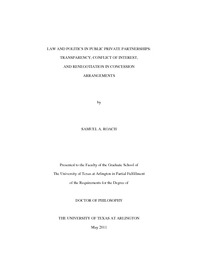
ATTENTION: The works hosted here are being migrated to a new repository that will consolidate resources, improve discoverability, and better show UTA's research impact on the global community. We will update authors as the migration progresses. Please see MavMatrix for more information.
Show simple item record
| dc.contributor.author | Roach, Samuel A. | en_US |
| dc.date.accessioned | 2011-07-14T20:54:01Z | |
| dc.date.available | 2011-07-14T20:54:01Z | |
| dc.date.issued | 2011-07-14 | |
| dc.date.submitted | January 2011 | en_US |
| dc.identifier.other | DISS-11103 | en_US |
| dc.identifier.uri | http://hdl.handle.net/10106/5845 | |
| dc.description.abstract | Many states and local governments have begun to use the Public-Private Partnership (PPP) vehicle as a policy tool in the area of highway transportation infrastructure development. A particular type of PPP, sometimes referred to as a "concession," can involve a state or local government's grant of concession rights, which typically includes the right to collect toll revenues on a roadway, to a private entity in exchange for the private entity's development and management of the roadway. As highway concession practice in the U.S. is a recent phenomenon, policymakers and other interested observers can benefit from a greater understanding of these arrangements. One important area of concession arrangements involves the legal framework of the state in which the concession project occurs. Indeed, state laws can exert tremendous influence upon transportation infrastructure concession arrangements and may serve as one of the most important factors concerning whether a concession deal comes to fruition. While many private entities may not consider certain a particular state as a potential locale for their projects because of what they perceive as unfavorable state laws, a state's legal framework may lack a sufficient legislative scheme in order to adequately account for public interest concerns. The dissertation includes six case studies of PPP projects in the U.S. in order to provide further insight into these arrangements and examines three important areas - confidentiality and transparency, conflict of interest, and contract renegotiation - where the legal framework of a state can significantly impact a transportation infrastructure concession arrangement. The paper compares and contrasts the legal framework of Texas with another state and model legislation and then offers suggested revisions to Texas law in order to improve its PPP concession policy. | en_US |
| dc.description.sponsorship | Anjomani, Ardeshir | en_US |
| dc.language.iso | en | en_US |
| dc.publisher | Urban & Public Affairs | en_US |
| dc.title | Law And Politics In Public-private Partnerships: Transparency, Conflict Of Interest, And Renegotiation In Concession Arrangements | en_US |
| dc.type | Ph.D. | en_US |
| dc.contributor.committeeChair | Anjomani, Ardeshir | en_US |
| dc.degree.department | Urban & Public Affairs | en_US |
| dc.degree.discipline | Urban & Public Affairs | en_US |
| dc.degree.grantor | University of Texas at Arlington | en_US |
| dc.degree.level | doctoral | en_US |
| dc.degree.name | Ph.D. | en_US |
Files in this item
- Name:
- Roach_uta_2502D_11103.pdf
- Size:
- 683.1Kb
- Format:
- PDF
This item appears in the following Collection(s)
Show simple item record


